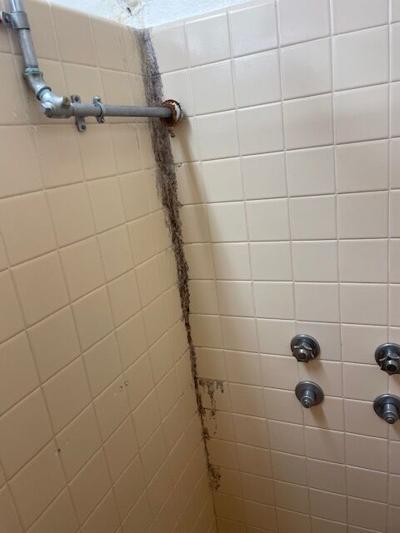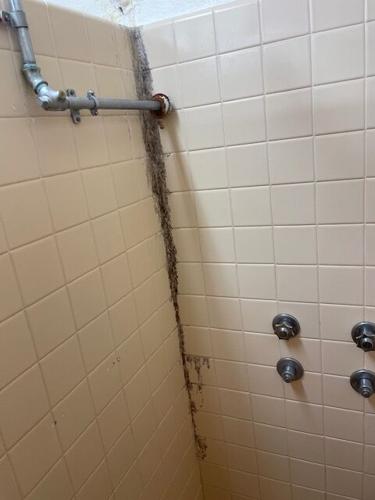When Melissa Farrar moved her daughter into Hill Hall, she never envisioned her daughter would fall sick a mere week later and be ill for over two months. When two rounds of antibiotics were unsuccessful at eradicating fatigue, headaches, congestion and a cough so severe it caused a muscle injury, Farrar began to look for the source of the problem.
Kristee Marconi had a similar experience during her son’s first semester at UGA this fall. After dealing with sickness on and off for most of the semester, Marconi’s son, who has asthma, found himself in the emergency room after a severe asthma attack. Marconi said that a doctor told her the catalyst behind the attack was mold exposure.
The more Farrar talked to other parents, the more parents she found like Marconi who were also struggling. Parents and students began to come forward about their own experiences with numerous doctor’s visits, unsuccessful antibiotics and countless negative tests for common illnesses.
On Facebook, parents began to share pictures of mold in UGA dorm bathrooms, ceilings, air conditioning filters and HVAC systems. Despite all of this, they said there was a notable lack of response from the university on the issue, such as work orders never being completed and vague or defensive emails.
It was in early October that Farrar met Rebecca Etheridge, another concerned parent with a background in construction. She also lost her home to mold in the past, and had been sure to be especially careful when choosing her daughter’s dorm as a result of her past mold exposure. Yet despite all of her precautions, she said her daughter is still dealing with sickness and worsening breathing issues.
Etheridge said she began to collect information from parents and soon found herself attempting to correspond with over 200 parents who were reaching out with their own personal stories from every dorm on campus, solidifying her belief that this is not an isolated incident. As a result, on Nov. 3 she created a new Facebook page titled “UGA Dorm Concerns Page for Parents and Students.” As of Nov. 30, that group has more than 390 members.
A search for answers
Etheridge and Farrar began to email the university looking for answers. Farrar reached out first to the president’s office and said she was told the dorm conditions were most likely a result of heavy rains the previous week, an answer that Farrar found unsatisfactory.
Having attached a picture of an AC unit in Creswell, Linda Kasper, executive director of University Housing, told Farrar the units hadn’t been replaced in over ten years and should’ve been replaced four years ago. The unit in question was replaced soon after, Farrar said. However, Farrar received no response regarding her daughter’s dormitory, Hill Hall, so she reached out to Victor K. Wilson, the vice president of student affairs, on Oct. 20.
Wilson explained that maintenance was working to replace the pipes in Hill Hall and had taken all of the necessary steps to correct the issue.
Other parents who reached out were met with either no response or emails saying that only students should be reaching out about these issues.
“I started to see parents saying, ‘Well, I started to reach out to my child or I reached out,’ and then my child got a response from the school saying, ‘Don’t have your parent contact us,’” Etheridge said.
UGA’s response
The university did email Hill Hall residents when mold growth was identified there, but Etheridge found herself frustrated with both the lack of information and the word choices.
As a result, Etheridge reached out to a variety of different offices ranging from University Housing to the Office of the President. She said she received an unexpected call from Kasper on Oct. 28.
In the 90-minute phone call, Etheridge said she was able to move from a place of defensiveness to a genuine dialogue with Kasper where she voiced many of her concerns.
“She admitted that they had not replaced, had not checked, the AC filters prior to the students moving in this fall,” Etheridge said.
It was statements like these that led Etheridge to believe this is a deeper problem.
The issue of the mold in Hill Hall was a big part of the conversation as the university did find mold in the building. Kasper said the insulation on the four-pipe HVAC system found in each dorm room was staying wet, a problem that they are now working to remedy, Etheridge said.
Etheridge, however, had more of a problem with the wording the university used to explain the situation to the residents of Hill Hall.
“I’m aware that cladosporium [mold] was found there and I did let her know that I was concerned with their correspondence because they just sort of mentioned it,” Etheridge said.
Cladosporium is one of the most common types of indoor mold. The Centers for Disease Control and Prevention states on its website that exposure to this mold can lead to symptoms such as stuffy nose, wheezing, and red or itchy eyes or skin.
Etheridge said the university told students that the mold was only a concern for immunocompromised students.
Kasper said UGA Housing was planning to revisit the efficiency of its maintenance system. Etheridge, though, has remained disappointed as she was hoping for more concrete action.
“We conduct routine maintenance on each of the systems present in the residence halls, and have a team of skilled trades workers who work throughout housing. In addition, we conduct periodic air quality testing of halls. We also rely on students reporting issues they experience while living on campus. When we receive reports, we send staff to investigate to remediate and resolve the situation,” said Carrie Campbell, senior public relations coordinator for University Housing.
In a Nov. 16 email to The Red & Black, UGA spokesperson Rod Guajardo said the university recently found that insulated piping in Hill Hall had become saturated. He said UGA contracted with a vendor to remove and replace the insulation, and the work was completed within two weeks.
“Test results confirmed the presence of common, everyday molds and in concentration levels significantly lower than the levels of outside air,” Guajardo said. “The work previously completed by vendors addressed the test-result findings, and we kept student residents updated on this process every step of the way.”
Going forward
Etheridge said she has heard back from Kasper since they talked, but the email relayed no additional information, with Etheridge describing it as “generic” and “unacceptable.” She said she found an independent agency eager to work with the university to remedy the problem and mentioned this to Kasper, but has not yet received any request for this company’s information.
Farrar also has heard little else beyond what information Etheridge was able to share with her.
“I understand that kids move to Georgia or they’re suddenly in this huge university environment with all these other people or it’s seasonal or they’re stressed so their immune system is down, but those are transient sicknesses. These have been going on and on,” Farrar said.



